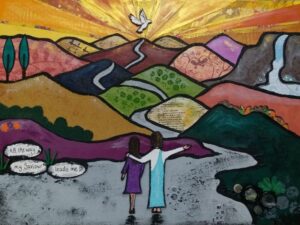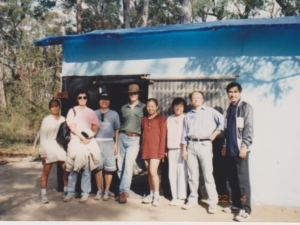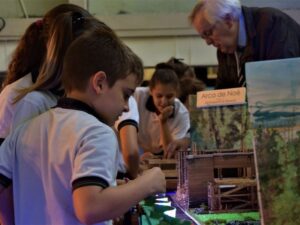
Cross Over to the Other Side
For Christians, the word ‘cross’ symbolises the centrepiece of our faith. However, it is also a verb which denotes an action, a definite and deliberate

Joel Hernandez and his wife Amy live in Dubuque Iowa (USA) where Joel serves as elder at Anchor Community Church and Chair of Intercultural Studies at Emmaus Bible College. He serves on the board of Christian Missions in Many Lands, Emmaus International, and a number of mission organizations in the US and Latin America. His passions include the Gospel, missions, church planting, music, and grand-parenting
“For this reason I bow my knees before the Father, from whom every family in heaven and on earth is named, that according to the riches of his glory he may grant you to be strengthened with power through his Spirit in your inner being, so that Christ may dwell in your hearts through faith– that you, being rooted and grounded in love, may have strength to comprehend with all the saints what is the breadth and length and height and depth, and to know the love of Christ that surpasses knowledge, that you may be filled with all the fullness of God.” (Eph. 3:14-19 ESV)
Paul’s prayers make me ponder. His themes seem so foreign to mine. He prayed earnestly that God would so strengthen believers that they would begin to grasp collectively the vast dimensions of the love of Christ, and to experience it together. Christ’s love, I hear him say, so defies measure that it takes all believers, each with their own perspective, to begin to grapple with its magnitude.
“With all the saints.”
I used to think the phrase meant all the believers in my local church. If so, the implications on attendance and participation in church life are crucial. But is that the circle Paul envisioned? Church fellowship tends to homogenize our perspective. In time, the Body begins to speak with one voice; to see things from a single perspective, and to conclude, rather complacently, that such is enough and right. We tend toward isolation. Is it possible the apostle envisioned more?
Something happened a few years ago that challenged my perspective. I met believers from other countries. My colleague, Mr Ken Fleming, was retiring from a long trajectory teaching missions at Emmaus Bible College USA. He urged me to attend the fourth International Brethren Conference on Mission held in Germany in 2007, explaining the obvious: the best way to learn about missions is by meeting missionaries and the best place to meet them is at mission conferences. The experience was jarring. Here were people from many countries—fellow believers—whose perspective differed widely from my own. My defences were up.
Four years later I attended the International Brethren Conference on Mission (IBCM) in France. This time the sizeable contingency of Hispanics met and talked together. Questions surfaced. Why have we never met? Why do we know so little about what the Lord is doing in our respective countries? Why are we not encouraging, praying for, and learning from one another? We resolved to fix that.
Once we decided to listen to each another, to appreciate one another, and to work together despite our differences, the Lord began strengthening us and rooting us in love
Joel Hernandez, CMML Director Tweet
Two years later we convened the first IBCM Hispano in Buenos Aires. We acknowledged we have always considered ourselves mission field instead of mission senders, and resolved to change. We rejoiced with brethren from Colombia as they sent their first missionaries to China. In 2015 established mission service organizations worldwide challenged and encouraged leaders from Latin American countries to develop their own organizations. In 2017 Dominican Republic brethren demonstrated their warm hospitality hosting the second IBCM Hispano. In the spirit of the Brethren Training Network, Bible trainers from the Spanish-speaking world met in Quito in July 2018. They launched ASIB, the Association of Seminaries and Bible Institutes, to stimulate one another in the work of Bible training.
The point is not that we’ve accomplished much. The point is that once we decided to listen to each another, to appreciate one another, and to work together despite our differences, the Lord began strengthening us and rooting us in love. Historical international animosities, jealousies, and stereotypes that are so rooted in our respective Hispanic cultures began melting away and give way to a fresh new collaboration.
My brothers from other countries don’t think like I do. But I am no longer weary about our differences; I am grateful for them. Their stories of God’s great deeds deepen my faith; their vision inspires me, their sacrificial commitment rebukes me, their pleas for help move me.
My perspective is changing. The circle of believers that challenges me to consider the dimensions of Christ’s love is widening. And so is my experience of Christ’s love.

For Christians, the word ‘cross’ symbolises the centrepiece of our faith. However, it is also a verb which denotes an action, a definite and deliberate

“Why not try to paint a picture based on your favourite hymn?” There are many hymns I love, so it’s always hard to choose a

I was raised in a Christian family and was 12 when the Lord called my parents to missionary service. Seeing other countries and cultures was

“You’re not Irish!” he said with a derogatory smile on his face. I was confused, because I thought I was. Some might quip that it

What playlist have you planned to use this summer and what’s it called? Nowadays many of us use playlists on our phones or tablets to

Some words can provoke a reaction. I have sometimes spiced up a conversation with friends by dropping in a word that I know will be

What do you think is the greatest challenge for missionaries? Apparently it’s not necessarily the uncomfortable climate, the unfamiliar diet, the difficulties of language, the

Interesting times we live in! Even if you were alive for the last global pandemic, none of us have experienced anything like this before. The

In this blog, let us think about how our strategies in mission compare with the early church in Acts. Here are two passages from Acts which

Standing one evening with my grandson, who was three years old at the time, we were gazing into the dark night sky. Trying to be

God’s call to us was progressive, slow and measured. Probably, in my case, it started when I was born to missionary parents who came from

Coronavirus: the word on everyone’s lips and the fear in (almost) everyone’s hearts. Response to the pandemic has been mixed. We cannot fail to be

With every job description comes information about the task at hand: what have I to do? Who do I report to? What resources are available

What does it mean to waste life? This is a burning question that all human beings need to face as individuals. Many are wasting the

Being a missionary is not an occupation that many young people would consider these days. When I started as a missionary, there was no salary,

It was toward the end of 1989 when the Lord stopped me in my tracks. For years I had heard the gospel through a Christian

In Acts 8:26-35, we eavesdrop as Philip shares the Message of Jesus with a fellow-traveller. 1) Listening to God (8:26, 29) Philip was a person open

In my first blog I mentioned how important Christian camps have been to us as a family and especially to our two boys Josiah and Joseph.

What should our strategy for mission be?That’s a question many books and articles seek to grapple with. But whilst a lot of these strategies are

These were the remarkable words that Jesus said to his disciples. They’d seen that the crowd who were there to listen to Jesus were in
If you would like to receive information about our next events feel free to sign up to our mailing list.
© Copyright 2019 GLO Europe. All Rights Reserved | GLO-Europe is a charitable Trust based at 78 Muir Street, Motherwell, ML1 1BN.